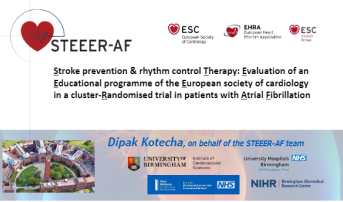STEEER-AF: Educating Healthcare Workers Improves Adherence to Guidelines
When measured objectively, baseline adherence was “much, much worse” than expected in this first trial from the ESC.

LONDON, England—A focused educational intervention directed at healthcare professionals can help boost the delivery of guideline-directed care for patients with atrial fibrillation (AF), according to the cluster-randomized STEEER-AF trial, the first RCT sponsored by the European Society of Cardiology (ESC).
Centers that received the additional education were more likely to adhere to class I or III recommendations around rhythm control from the 2016 and 2020 versions of the European AF guidelines than were centers that continued with their usual practices, Dipak Kotecha, MBChB, PhD (University of Birmingham, England), reported here at the ESC Congress 2024.
There was not a significant impact on adherence to guidance around stroke prevention. But, use of anticoagulation—a key component of stroke prevention—was “exceptionally high” at baseline, Kotecha pointed out. “That was very hard to change with any intervention when you already have a 90-plus percent adherence rate.”
The study, “obviously should be a bit of a wake-up call for all of us,” he concluded. “It’s fantastic seeing so many trials being presented . . . but unless those results are actually implemented in our patients, we won’t see the benefits for them and for our health systems. So I think we should all work very much harder on how we do this.”
He noted that some of the lessons of this trial have been incorporated into the 2024 iteration of the European AF guidelines, which were released during the meeting and published online in the European Heart Journal.
Kotecha, who chaired the new guidelines along with Isabelle Van Gelder, MD, PhD (University Medical Center Groningen, the Netherlands), noted that there is also a patient version of the document available. “We hope that together with our patients, we can start to improve outcomes for people with atrial fibrillation,” he said.
The STEEER-AF Trial
AF is becoming a more common problem as the population ages, creating issues not only for patients, but also healthcare systems. It already accounts for 1% to 2% of healthcare costs in most European countries, and that’s expected to increase in the coming decades, Kotecha said.
Prior research has shown that patients have better outcomes when they are treated according to guideline recommendations, particularly when it comes to use of anticoagulation for stroke prevention, and “it’s a key task for us that we should try to implement these guidelines in our clinical practice,” Kotecha said. Previous studies also have demonstrated that focused education for patients can improve clinical outcomes and quality of life.
It had remained unclear, however, how well clinicians truly were adhering to the AF guidelines in practice, due to the limitations of observational studies and surveys, and whether focused educational interventions directed toward healthcare professionals could enhance the delivery of guideline-directed care, which would be expected to then improve patient outcomes.
To explore this issue, Kotecha and colleagues designed STEEER-AF, the ESC’s first randomized trial, performed in collaboration with the European Heart Rhythm Association (EHRA) and the ESC’s Council on Stroke. It was conducted at 70 centers across six European countries.
Using the best resources of the ESC and EHRA, Kotecha said, the researchers developed a focused educational intervention aimed at increasing adherence to the class I and III recommendations in the AF guidelines (because they’re the strongest), with a concentration on stroke prevention, rhythm control, and integration of care, and recruited 18 expert trainers to deliver it. Centers that enrolled up to 25 patients were randomized to either receive the educational program for their healthcare workers or continue with their usual practices.
Ultimately, the trial included 1,732 patients (mean age 69 years; 37% women). At baseline, 89% were on oral anticoagulation, 79% on any type of rate control, and 32% on antiarrhythmic drugs. Overall, 41% had undergone catheter ablation previously and 26% were scheduled to be treated with cardioversion or ablation.
As baseline, adherence to all relevant class I or III recommendations was 61.0% for stroke prevention and 21.0% for rhythm control. “Guideline adherence was much, much worse than we had expected. Using this objective approach, we actually found that guideline adherence was quite low,” Kotecha said.
The co-primary outcomes of the trial were changes in guideline adherence for stroke prevention and rhythm control 6 to 9 months after delivery of the educational intervention. Through a median follow-up of 7.7 months, there was a significant impact on rhythm control, but not stroke prevention.
Adherence to all strong rhythm control recommendations increased from 20.5% to 22.9% in the control group and from 21.4% to 33.9% in the intervention group, representing a significantly greater effect with the educational program. For stroke prevention, there was an increase from 58.6% to 60.9% in the control group and from 63.4% to 67.5% in the intervention group, which indicated no significant difference between trial arms.
A clue about the discordance between the two primary endpoints can be seen among the secondary endpoints, with anticoagulation use that remained high in both trial arms throughout the study period and a measure of integrated AF management indicating greater improvement at centers that received the focused educational intervention.
This latter outcome is patient-reported, Kotecha noted, incorporating an assessment of the quality of the clinical interaction centered around questions about patient empowerment to make decisions and access to a multidisciplinary team. Those are the “sorts of things we know are really critical, particularly in rhythm control, where the decisions on treatment are much more difficult,” he said.
Implementation as ‘Need and Opportunity’
Before starting his discussion after Kotecha’s results, Christopher Granger, MD (Duke University, Durham, NC), acknowledged that he is a “huge supporter of implementation efforts to improve the application of guideline-directed care.”
He noted that treatments for cardiovascular conditions with top-level evidence supporting their use get delivered only about half of the time and that even when they’re prescribed, patients use them only about half of the time. Implementation, then, “is an enormous need and opportunity,” he said.
On that background, STEEER-AF showed that delivering focused education to healthcare professionals to improve care provided to patients “is possible in the context of the centers and the framework of this trial,” Granger said. Moreover, he called it “the [clearest] trial that I’ve seen that a targeted healthcare professional education [intervention] can make a measurable impact on improving guideline-directed care.”
For Granger, an important open question, however, is how to “get to the next step of having a sustained and systematic approach to applying this in practice, to scale it to general practice settings.”
Todd Neale is the Associate News Editor for TCTMD and a Senior Medical Journalist. He got his start in journalism at …
Read Full BioSources
Kotecha D. STEEER-AF – stroke prevention & rhythm control therapy: evaluation of an education programme of the European Society of Cardiology in a cluster-randomised trial in patients with atrial fibrillation. Presented at: ESC 2024. September 1, 2024. London, England.
Disclosures
- The trial was sponsored by ESC and funded by ESC and EHRA, with educational grants from Boehringer Ingelheim, BMS-Pfizer, Bayer, Daiichi Sankyo, and Boston Scientific and grant funding from the NIHR Oxford Biomedical Research Centre & BHF Birmingham Accelerator.
- Kotecha reports institutional or personal relationships with Bayer, Amomed, Protherics Medicines Development, MyoKardia, Daiichi Sankyo, Boehringer Ingelheim, BMS-Pfizer Alliance, the UK National Institute for Health and Care Research, the British Heart Foundation, the EU/EFPIA Innovative Medicines Initiative (including industry collaboration from Bayer, Novartis, Servier, the HYVE, and Vifor), Boston Scientific, Daiichi Sankyo, EU Horizon (including industry collaboration from Roche, MedicineMan and Microlife), UKRI (including industry collaboration from Roche, MedicineMan and Microlife), the UK National Health Service -Data for R&D- Subnational Secure Data Environment program, the UK Dept. for Business, Energy & Industrial Strategy Regulators Pioneer Fund, the Cook & Wolstenholme Charitable Trust, and the Wellcome Trust (London).
- Granger reports research contracts with Anthos, Apple, Alnylam, AstraZeneca, Bayer, BMS, Boehringer Ingelheim, Daiichi Sankyo, Janssen, Novartis, GSK, Medtronic Foundation, Philips, Pfizer, the US Food and Drug Administration, and the National Institutes of Health; consulting fees/honoraria from Abiomed, AstraZeneca, Bayer, Celecor, BMS, Boston Scientific, GSK, Janssen, Pfizer, Lilly, Daiichi Sankyo, Merck, Novartis, Novo Nordisk, Boehringer Ingelheim, Medtronic, Medtronic Foundation, and Roche; and equity in tenac.io.






Comments